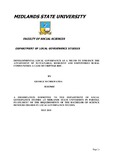Please use this identifier to cite or link to this item:
https://cris.library.msu.ac.zw//handle/11408/3098Full metadata record
| DC Field | Value | Language |
|---|---|---|
| dc.contributor.author | Chikwanda, George M. | - |
| dc.date.accessioned | 2018-08-28T08:52:15Z | - |
| dc.date.available | 2018-08-28T08:52:15Z | - |
| dc.date.issued | 2018 | - |
| dc.identifier.uri | http://hdl.handle.net/11408/3098 | - |
| dc.description.abstract | “Local Government is the heart and soul of any Government for the people and by the people. It is through local authorities that a country’s development is realized. Every investor has to work with local authorities for taxation, rates and other services offered in both rural and urban areas” (Harare Residents’ Trust 2017). This study seeks to recommend how Local Governments can improve their role in promoting Local Development by using the Developmental model of Local Governance. Developmental Local Governance generally represents a paradigm shift in the Local Governance mandate, as it is an approach which seeks to make Local Governments go an extra-mile from their traditional and mandatory service delivery function towards promoting local socio-economic development within their areas of jurisdiction. The research is anchored on achieving the following objectives: (i) to determine the causes of poverty and underdevelopment in the CRDC area (ii) to establish the strategies that are being implemented to enhance local development in CRDC area and (iii) to determine the existing local opportunities and value chains that must be tapped in Chipinge RDC area to enhance sustainable local economic development using a developmental local governance model. The research was conducted in Chipinge RDC area where the researcher noted that a number of problems and or challenges were bedeviling the RDC area. The underpinning concepts of the Developmental Local Governance model were reviewed, analyzed and contextualized. The study used both qualitative and quantitative research designs. In trying to enhance validity and reliability, the researcher employed both probability and non-probability sampling techniques. The probability sampling techniques used includes simple random sampling, stratified sampling and systematic or interval sampling while the non-probability sampling techniques used includes purposive or judgemental sampling, convenience or accidental sampling. From the target population of 130 396 people, 32 respondents were selected to participate in the research. Among the sample population were 3 Chipinge RDC Officials, 3 NGO Officials, 6 Government Officials, 3 Ward Councillors, 2 Traditional Leaders, 3 Local Politicians and 12 residents. The research tools which were used in the research are questionnaires (both closed-ended and open-ended questions), interviews (both structured and semi-structured interviews), observations as well as focus group discussions. Each of these research instruments used has its own inherent weakness which were however countered by using different research tools. Research findings showed that there were high levels of poverty in the Chipinge RDC area. The research findings also showed that there were numerous problems within Chipinge RDC area. Some of the challenges includes but not limited to poverty, poor access to the market, poor road infrastructure, crop and livestock diseases and pests, deforestation, stream bank cultivation, siltation, cultivation on wetlands to mention but a few. Also, poor service delivery particularly in the water and sanitation and road infrastructure services in the Chipinge RDC area accompanied the research findings. In addition, there are a number of value chains and opportunities in Chipinge RDC area which are unfortunately being undercapitalized. These includes wildlife, livestock, wild fruits, apiculture, forestry and timber, irrigation crop farming, diversified crop production to mention but a few. A survey from the respondents showed that despite these various opportunities and value chains that can be tapped into for sustainable local economic development in Chipinge, there was still high levels of poverty and underdevelopment in the RDC area. Respondents implicated this mainly to the failure to value add local resources locally, lack of access to the market facilities, poor road infrastructure and undercapitalization of the local opportunities by the local residents in the RDC area. The mentioned challenges and opportunities require that Chipinge RDC adopts the developmental Local Governance approach as a means by which it will promote the attainment of sustainable, resilient and empowered rural communities in the RDC area. | en_US |
| dc.language.iso | en | en_US |
| dc.publisher | Midlands State University | en_US |
| dc.subject | Local government | en_US |
| dc.subject | Zimbabwe | en_US |
| dc.subject | Local authorities | en_US |
| dc.subject | Rural communities | en_US |
| dc.title | Developmental local governance as a means to enhance the attainment of sustainable, resilient and empowered rural communities: a case of Chipinge RDC. | en_US |
| item.languageiso639-1 | en | - |
| item.grantfulltext | open | - |
| item.fulltext | With Fulltext | - |
| Appears in Collections: | Bsc Local Governance Studies Honours Degree | |
Files in This Item:
| File | Description | Size | Format | |
|---|---|---|---|---|
| George Chikwanda final draft.pdf | Full Text | 1.63 MB | Adobe PDF |  View/Open |
Page view(s)
134
checked on Apr 13, 2025
Download(s)
78
checked on Apr 13, 2025
Google ScholarTM
Check
Items in MSUIR are protected by copyright, with all rights reserved, unless otherwise indicated.



